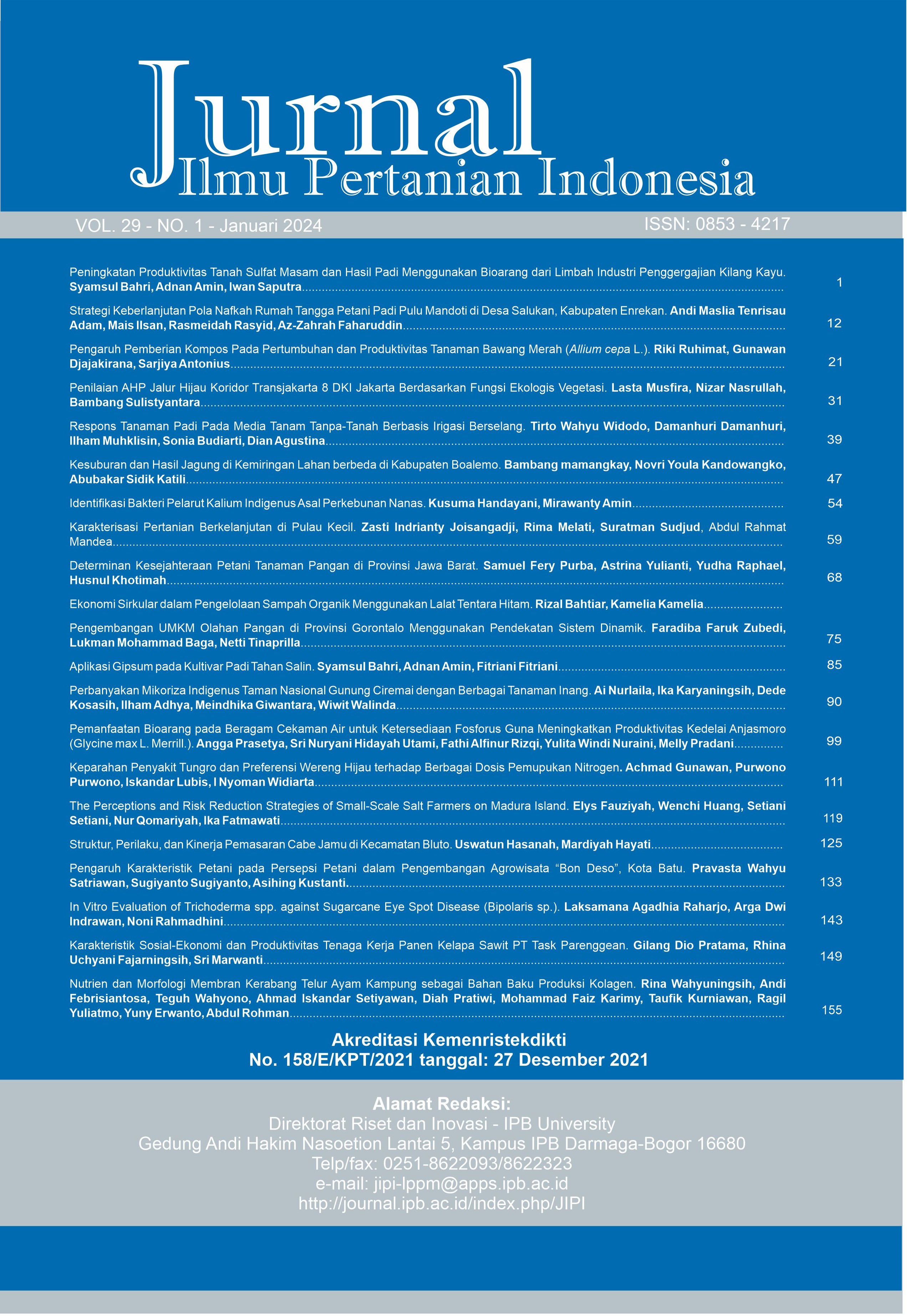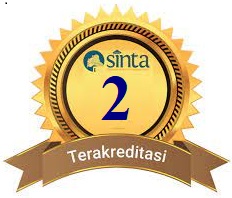Strategi Keberlanjutan Pola Nafkah Rumah Tangga Petani Padi Pulu Mandoti di Desa Salukan, Kabupaten Enrekang
Abstract
Pulu mandoti is a local type of rice that is fragrant and rare. This glutinous rice has a high selling price and can only thrive when planted in Salukanan Village. However, its productivity is still relatively low, so efforts are needed to sustain the farming business. This study aims to analyze farmer households' livelihood patterns and sustainability strategies. The respondents were 50 farmers selected using simple random sampling. The data were analyzed in descriptive, qualitative, and quantitative ways. The results showed that the pattern strategy of pulu mandoti rice farmer households is an intensification and extensification strategy in agricultural landuse, and diversification strategies in the livestock, service, trade, and employment sectors. The sustainability of farming livelihood patterns resulted in an index of 89.66%, included in the sustainable category. The government needs to pay attention to production factors that affect the productivity of pulu mandoti rice farming so that farming can be sustainable.
Keywords: diversification strategy, extensification and intensification, livelihood pattern, pulu mandoti, rice production
Downloads
References
Adam AMT. 2017. Peran Gender Dalam Rumahtangga Usaha Persuteraan Alam Sebagai Strategi Penghidupan Berkelanjutan (Sustainable Livelihood). Disertasi. Ilmu Pertanian. Sekolah Pascasarjana. Makassar (ID).
Adam AMT. 2020. “Efek Dominasi Peran Gender Terhadap Keberlanjutan Pola Nafkah Usaha Budidaya Murbei Dan Pemeliharaan Ulat Sutera.” Jurnal Galung Tropika 9(2):174–86.
Arikunto S. 2006. Metode Penelitian Kualitatif. Jakarta (ID): Bumi Aksara.
Assan A. 2019. “Strategi Bertahan Hidup Petani Gurem Kabupaten Kutai Barat.” EJournal Sosiatri-Sosiologi 7(3):54–67.
Darwis, Elfidri, Syafrizal, Mahdi. 2015. Livelihood Assets Affecting The Success of Fisherman’s Housholds Moving Out of Poverty. Inernational Journal of Research In Social Sciences. 5(3)(May): 33–42.
Dinas Pertanian Kabupaten Enrekang. 2017. Deskripsi Indikasi Geografis Beras Pulu Mandoti Kabupaten Enrekang. Enrekang (ID).
Dirribsa S, Tassew B. 2015. Analysis of Livelihood Diversification Strategy of Rural Household: A Case Study of Ambo District, Oomiya Regional State, Ethiopia. International Journal of Current Research and Academic Review. 3(8):406–26.
Ellis, Frank. 2000. Rural Livelihood Diversity in Developing Countries: Evidence and Policy Implications. Overseas Development Institute, London (June).
Gregoire, Corinne. 2012. Caribbean Sustainable Livelihoods: The Development of A Concept. World Journal of Science, Technology and Sustainable Development 9(2): 136–46. https://doi.org/10.1108/20425941211244289
Hautala RK. 2013. A Sustainable Livelihood Analysis of Small-Scale Farmers in M’muock, Cameroon Local Realities and Structural Constraints.” Thesis (May): 1–112.
Ikerd, John. 2012. Cooperation: The Key to Sustainable Livelihoods in Food Systems. Journal of Agriculture, Food Systems, and Community Development 3(1): 9–11. https://doi.org/10.5304/jafscd.2012.031.005
Karim, Abdul, Amrullah, Junaidin, Syukur A. 2020. Beras Lokal Pulu ’ Mandoti Penopang Ekonomi Dan Ketahanan Pangan Masyarakat Desa Salukanan Di Tengah Crisis Pandemic Global ‘ Covid-19. Bosowa University. (May): 1–5. https://doi.org/10.38124/IJISRT20SEP485
Martopo, Anton, Gagoek H, Subaryanto. 2012. Kajian Tingkat Penghidupan Berkelanjutan (Sustainable Livelihood) Di Kawasan Dieng (Kasus Di Dua Desa Kecamatan Kejajar Kabupaten Wonosobo). ”Pp. 412–18 in Prosiding Seminar Nasional Pengelolaan Sumberdaya Alam dan Lingkungan. 11 September 2012. Semarang (ID).
Pradnyaswari I, Wijayanti WP, Subagiyo A. 2021. Tingkat Penghidupan Berkelanjutan Masyarakat Desa Purwakerti Kabupaten Karangasem. Pure Journal. 11(0341): 135–46.
Putra DF, Suprianto A. 2020. Analisis Strategi Penghidupan Petani Kopi Desa Medowo Menggunakan Pendekatan Sustainable Livelihood. Jurnal Pendidikan Dan Ilmu Geografi. 5(2): 132–143. https://doi.org/10.21067/jpig.v5i2.4773
Rahman, Sadique MD, Monoj KM, Hayder KS, Shirajum M. 2021. Livelihood Status of Coastal Shrimp Farmers in Bangladesh: Comparison before and during COVID-19. Aquaculture Reports 21(100895): 1–9. https://doi.org/10.1016/j.aqrep.2021.100895
Setiowati NE. 2016. Perempuan, Strategi Nafkah Dan Akuntansi Rumah Tangga. Perbankan Syariah Fakultas Syariah Dan Ekonomi Islam. 1:298–304.
Sudjana. 2005. Metode Statistika. 5th ed. Bandung (ID): Tarsito.
Turasih, Adiwibowo S. 2012. Sistem Nafkah Rumah Tangga Petani Kentang Di Dataran Tinggi Dieng (Kasus Desa Karangtengah, Kecamatan Batur, Kabupaten Banjarnegara, Provinsi Jawa Tengah). Jurnal Sosiologi Pedesaan. 6(2): 196–207.
Ustriyana ING, Artini NWP. 2018. Analysis of Sustainability Index Usahatani Cabai in Bangli Regency. SOCA: Jurnal Sosial Ekonomi Pertanian 12(1): 99–108. https://doi.org/10.24843/SOCA.2018.v12.i01.p08
Widodo S. 2011. Strategi Nafkah Berkelanjutan Bagi RUmah Tangga Miskin Di Daerah Pesisir. Makara, Sosial Humaniora. 15(1): 10–20. https://doi.org/10.7454/mssh.v15i1.890
Wijayanti R, Baiquni M, Harini R. 2016. Strategi Penghidupan Berkelanjutan Masyarakat Berbasis Aset Di Sub DAS Pusur, DAS Bengawan Solo. Jurnal Wilayah Dan Lingkungan. 4(2): 133–152. https://doi.org/10.14710/jwl.4.2.133-152
Yang, Lun, Moucheng Liu, Fei Lun, Qingwen Min, Canqiang Zhang, Heyao Li. 2018. Livelihood Assets and Strategies Among Rural Households: Comparative Analysis of Rice and Dryland Terrace Systems in China. Sustainability (Switzerland) 10(2525): 1–18. https://doi.org/10.3390/su10072525
Copyright (c) 2023 Andi Maslia Tenrisau Adam Adam

This work is licensed under a Creative Commons Attribution-NonCommercial 4.0 International License.
This journal is published under the terms of the Creative Commons Attribution-NonCommercial 4.0 International License. Authors who publish with this journal agree to the following terms: Authors retain copyright and grant the journal right of first publication with the work simultaneously licensed under a Creative Commons Attribution-NonCommercial 4.0 International License. Attribution — You must give appropriate credit, provide a link to the license, and indicate if changes were made. You may do so in any reasonable manner, but not in any way that suggests the licensor endorses you or your use. NonCommercial — You may not use the material for commercial purposes.























